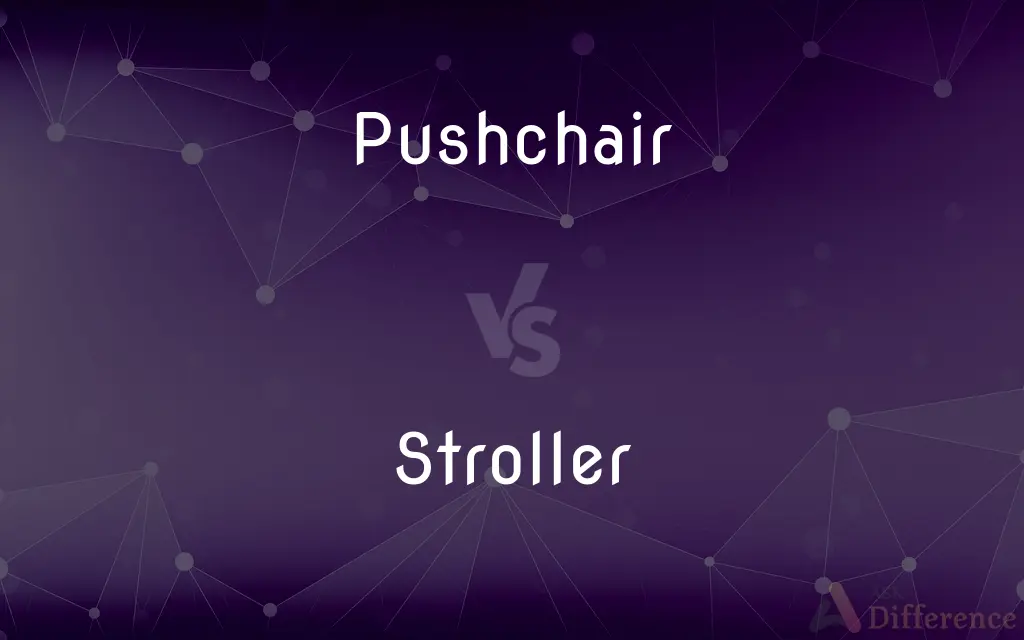Pushchair vs. Stroller — What's the Difference?
Edited by Tayyaba Rehman — By Urooj Arif — Published on March 1, 2024
A pushchair is designed for slightly older babies who can sit up, featuring reclining seats, while a stroller is lightweight, compact, and designed for easy mobility, often used from birth.

Difference Between Pushchair and Stroller
Table of Contents
ADVERTISEMENT
Key Differences
Pushchairs and strollers serve the purpose of transporting babies and young children, but they cater to different needs and ages. Pushchairs, often resembling prams but with adjustable seating, are suitable for babies who have begun to sit up. They come with features like reclining seats, providing comfort for various activities from sleeping to observing surroundings.
Strollers, on the other hand, are designed for convenience and portability, characterized by their lightweight and foldable design, making them ideal for travel and quick outings.
Pushchairs offer more robust features such as larger wheels for smoother rides and more storage space, whereas strollers prioritize ease of use and storage, with smaller wheels and a more compact form. This makes strollers a popular choice for navigating crowded city streets and public transportation. Pushchairs, with their sturdier build, are better suited for longer walks and can accommodate children as they grow.
The choice between a pushchair and a stroller largely depends on the child's age, the parents' lifestyle, and the types of outings they plan. For newborns and very young infants, a pushchair with a fully reclining seat or a pram is often recommended, while for quick trips and travel, a stroller offers convenience and agility.
Comparison Chart
Design Purpose
Designed for babies who can sit up.
Lightweight and compact for easy mobility.
ADVERTISEMENT
Features
Reclining seats, larger wheels, more storage.
Lightweight, foldable, smaller wheels.
Suitability
Slightly older babies and toddlers.
From birth, depending on the model.
Portability
Less portable due to size and weight.
Highly portable, ideal for travel.
Usage Scenario
Longer walks, versatility in seating.
Quick outings, crowded spaces, travel.
Comfort
Generally offers more comfort features.
Designed for convenience over long-term comfort.
Age Range
From when a baby can sit up to toddlerhood.
Newborns (with specific models) to toddlers.
Compare with Definitions
Pushchair
Designed for comfort and longer outings.
For their day trip, they preferred the pushchair for its durability and comfort.
Stroller
A compact, foldable carriage designed for mobility.
They brought a stroller for their vacation to easily move through the airport.
Pushchair
Offers smooth rides with larger wheels.
The pushchair's large wheels made it easy to navigate bumpy sidewalks.
Stroller
Ideal for travel and navigating crowded spaces.
The lightweight stroller was perfect for city outings and public transportation.
Pushchair
Suitable for babies who have begun to sit up.
As soon as their baby could sit up, they switched from a pram to a pushchair.
Stroller
Often used from birth with specific models.
Their stroller came with a bassinet attachment for the newborn phase.
Pushchair
A versatile baby carriage with reclining seats for sitting or lying down.
They used a pushchair for their toddler to nap comfortably during park walks.
Stroller
Prioritizes ease of use and storage.
Folding the stroller with one hand made getting on the bus much easier.
Pushchair
Provides more storage for baby essentials.
The spacious pushchair basket was perfect for storing diapers and shopping.
Stroller
Less suited for rough terrain due to smaller wheels.
They avoided gravel paths where the stroller's small wheels could get stuck.
Pushchair
A small carriage in which a baby or child is pushed around; a stroller or baby buggy.
Stroller
A carriage with three or four wheels and often having a retractable hood, that is pushed while walking to transport a infant or young child.
Pushchair
A small vehicle with four wheels in which a baby or child is pushed around
Stroller
A seat or chair on wheels, pushed by somebody walking behind it, typically used for transporting babies and young children.
Stroller
A small vehicle with four wheels in which a baby or child is pushed around
Common Curiosities
What is a stroller?
A stroller is a lightweight, compact carriage for transporting babies and young children, designed for portability and ease of use.
What is a pushchair?
A pushchair is a baby carriage designed for infants who can sit up, featuring adjustable seating options for comfort.
Can newborns use strollers?
Yes, some stroller models are suitable for newborns, especially those that recline fully or have bassinet attachments.
Are strollers allowed on airplanes?
Yes, most airlines allow strollers, with many offering gate check services to make travel with young children easier.
Which is better for long walks, a pushchair or a stroller?
A pushchair is generally better for long walks due to its sturdier build, larger wheels, and more comfortable seating.
Do pushchairs come with car seat attachments?
Many pushchairs are part of travel systems that include car seat attachments, offering versatility from car to walking.
How do I store a stroller when not in use?
Most strollers are foldable, designed to take up minimal space, making them easy to store in closets, car trunks, or other tight spaces.
Can I find a stroller that grows with my child?
Yes, many strollers are designed to adapt to growing children, with adjustable seating and convertible designs.
Is a pushchair or stroller better for running?
For running, a specialized jogging stroller with larger wheels and suspension is recommended for safety and comfort.
What should I consider when choosing between a pushchair and a stroller?
Consider your lifestyle, the age of your child, and where you plan to use it most, such as city streets, public transportation, or long walks.
Share Your Discovery

Previous Comparison
Earths’ Lithosphere vs. Earths’ Asthenosphere
Next Comparison
Diploma vs. Associate DegreeAuthor Spotlight
Written by
Urooj ArifUrooj is a skilled content writer at Ask Difference, known for her exceptional ability to simplify complex topics into engaging and informative content. With a passion for research and a flair for clear, concise writing, she consistently delivers articles that resonate with our diverse audience.
Edited by
Tayyaba RehmanTayyaba Rehman is a distinguished writer, currently serving as a primary contributor to askdifference.com. As a researcher in semantics and etymology, Tayyaba's passion for the complexity of languages and their distinctions has found a perfect home on the platform. Tayyaba delves into the intricacies of language, distinguishing between commonly confused words and phrases, thereby providing clarity for readers worldwide.














































